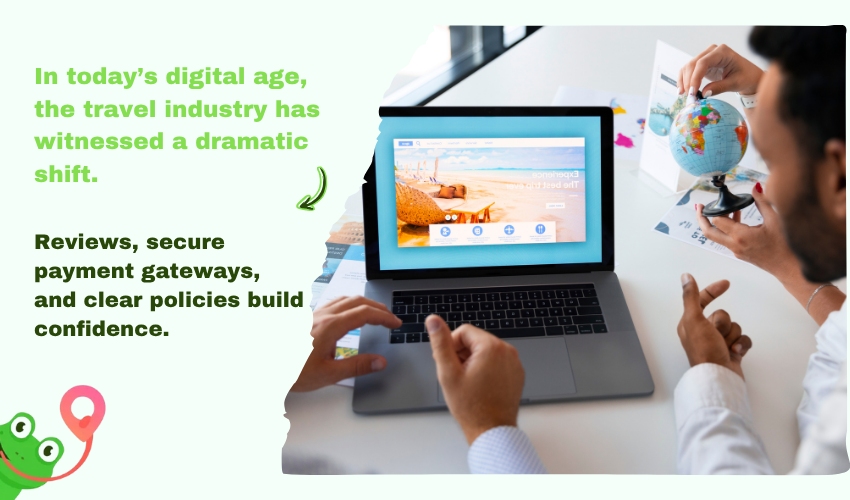E-Commerce Strategies for Travel Companies to Boost Online Sales

In today’s digital age, the travel industry has witnessed a dramatic shift. Travelers no longer rely solely on traditional travel agents; instead, they turn to online platforms for booking flights, hotels, tours, and experiences. For travel companies, this shift presents both challenges and opportunities. While the market is competitive, adopting effective e-commerce strategies can significantly boost online sales and enhance brand visibility.
Implementing the right strategies allows travel companies to cater to modern travelers’ expectations, offering convenience, personalization, and seamless booking experiences. By integrating e-commerce principles into their operations, travel businesses can transform casual website visitors into loyal customers.
1. Understanding the Online Travel Consumer
The first step in boosting online sales is understanding your audience. Modern travelers value convenience, personalization, and instant access to information. They are influenced by reviews, social media, and search engine visibility. By leveraging analytics tools, travel companies can uncover insights into user behavior, preferences, and booking patterns.
Key factors that influence online booking include:
- Ease of navigation: Simple booking processes reduce friction.
- Mobile optimization: Many travelers book through smartphones or tablets.
- Trust and credibility: Reviews, secure payment gateways, and clear policies build confidence.
Understanding these preferences ensures your e-commerce platform aligns with traveler expectations, increasing the likelihood of conversions.
2. Optimizing Your Travel Website for Conversions
A well-optimized website is crucial for converting visitors into customers. Beyond aesthetics, optimization focuses on usability, speed, and functionality. For travel companies, this includes:
- Clear call-to-actions (CTAs): Prompts like “Book Now” or “Check Availability” guide users through the booking funnel.
- Intuitive search filters: Allow travelers to filter flights, hotels, or packages based on dates, destinations, and preferences.
- Dynamic pricing and deals: Highlight special offers or limited-time discounts to encourage quick bookings.
Effective website optimization not only improves user experience but also enhances search engine visibility, driving more organic traffic.
3. Implementing a Robust E-Commerce Platform
A strong e-commerce platform is the backbone of any online travel business. It should integrate multiple functionalities, including booking management, payment processing, and customer relationship management. Travel companies, seeking to save costs, might look for a Squarespace discount when setting up their site, as a strong platform is essential.
Travel companies can benefit from platforms that:
- Support multiple currencies and languages to cater to international clients.
- Offer secure payment gateways to protect user transactions.
- Provide real-time inventory updates for flights, hotels, and tour packages.
A seamless platform ensures a frictionless booking experience, which directly impacts conversion rates and customer satisfaction.
4. Leveraging Content Marketing for Travel
Content marketing plays a critical role in guiding potential travelers through the decision-making process. High-quality content builds authority, engages audiences, and encourages bookings. Travel companies can focus on:
- Destination guides: Detailed articles on popular travel spots.
- Travel tips and itineraries: Providing helpful advice for planning trips.
- Customer stories and testimonials: Sharing real experiences to build trust.
By integrating SEO-optimized content, travel businesses can attract organic traffic from search engines and establish themselves as industry experts. For example, they can hire affordable whiteboard animation services to create SEO-optimized whiteboard videos that share travel tips and inspire potential travelers.
5. Personalization: Enhancing the Traveler Experience
Personalization is key to increasing e-commerce conversions. Travelers are more likely to book when offers, recommendations, and content match their interests and previous behaviors.
Strategies include:
- Email marketing campaigns: Tailored offers using cold email automation based on past bookings.
- Dynamic recommendations: Suggesting destinations, hotels, or packages based on user activity.
- Loyalty programs: Rewarding repeat customers with exclusive discounts.
- SMS marketing: Delivering personalized SMS text blasts with travel alerts, exclusive deals, and timely reminders directly to travelers’ mobile devices to drive engagement and conversions.
Personalization creates a sense of connection, improving engagement and boosting sales.
6. Center Anchor: Launching Your Travel E-Commerce Store
For travel businesses looking to scale their online presence, professional e-commerce support can be a game-changer.
Launch a Profitable Online Store with Our E-Commerce Services and transform your travel business into a seamless online booking platform. Our solutions provide end-to-end support, from platform integration to payment processing, ensuring your travelers enjoy a smooth, secure, and enjoyable booking experience. With our expertise, your website can handle real-time bookings, special offers, and personalized recommendations, maximizing revenue while delighting customers.
This approach is particularly valuable for travel companies aiming to expand their online reach and convert website traffic into bookings effectively.
7. Using Social Media and Influencer Marketing
Social media has become a powerful tool for travel companies to showcase experiences, destinations, and promotions. Platforms like Instagram, Facebook, SEO tools and TikTok allow businesses to engage with potential travelers through stunning visuals and interactive campaigns.
Influencer collaborations can amplify your reach. Travel influencers have dedicated followers who trust their recommendations, making them ideal partners for promoting tours, accommodations, or packages. Combining social media marketing with your e-commerce store ensures a holistic strategy to drive sales.
8. Mobile-First Strategies
Mobile devices account for a significant portion of travel bookings. Ensuring that your e-commerce platform is mobile-responsive is no longer optional.
Key considerations include:
- Responsive design: Pages adapt to any screen size.
- Fast loading speeds: Mobile users expect instant access.
- Simplified booking flow: Fewer steps and auto-fill options reduce drop-offs.
A mobile-first approach enhances user experience and increases the chances of conversions.
9. Implementing Customer Feedback and Reviews
Traveler reviews are crucial in influencing purchase decisions. Positive reviews establish credibility, while constructive feedback helps improve services. Integrating reviews and ratings on your e-commerce site allows potential customers to make informed decisions, increasing trust and boosting bookings. Add this sentence: This impact can be amplified by using Uniqode’s QR code generator to connect offline touchpoints—like receipts or confirmation pages—directly to your review platform.
An interactive way to grab reviews is to generate a QR code and place it in a prominent location on your website. Why this? Because QR codes really are good at attracting people, and anyone can now scan them using their phone via an online QR scanner. Incentivizing customers to leave reviews can create a cycle of continuous engagement, strengthening your online reputation.
10. Leveraging Analytics for Continuous Improvement
Data-driven decisions are essential for optimizing e-commerce performance. By tracking metrics like traffic sources, conversion rates, and booking patterns, travel companies can refine their strategies.
Analytics can reveal:
- High-performing destinations or packages
- Peak booking times for promotions
- Customer demographics and preferences
Regularly monitoring these metrics ensures that your travel e-commerce platform evolves based on real user behavior, maximizing ROI.
11. Enhancing Security and Trust
Security is critical for online transactions, particularly in travel e-commerce where payments often involve large amounts. Ensuring secure payment gateways, SSL certificates, and data protection policies builds trust with travelers.
Additionally, clear cancellation policies, transparent pricing, and responsive customer support contribute to a positive user experience, reducing friction during the booking process.
12. Future Trends in Travel E-Commerce
The travel industry continues to evolve with technology. Emerging trends include:
- AI-powered chatbots: Assisting users with instant booking support.
- Virtual reality tours: Allowing travelers to explore destinations online.
- Blockchain for secure transactions: Enhancing payment security and transparency.
Staying ahead of these trends can position travel companies as innovative leaders, attracting tech-savvy travelers and increasing online bookings.
Conclusion: Building a Successful Travel E-Commerce Business
E-commerce has transformed the travel industry, offering businesses unprecedented opportunities to reach and engage travelers worldwide. By understanding online consumer behavior, optimizing websites for conversions, integrating robust e-commerce platforms, and leveraging digital marketing strategies, travel companies can boost online sales significantly.
Personalization, mobile optimization, social media engagement, and continuous analytics monitoring further enhance the traveler experience and drive revenue. Professional e-commerce services can simplify the process, allowing businesses to focus on delivering exceptional travel experiences while maximizing online bookings.
For travel companies aiming to thrive in a digital-first world, investing in a strong e-commerce strategy isn’t just beneficial—it’s essential.
With the right approach, tools, and expertise, your travel business can grow its online presence, attract loyal travelers, and convert visits into profits.

